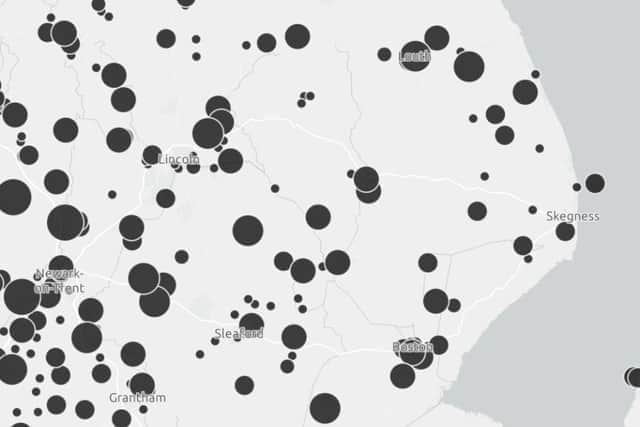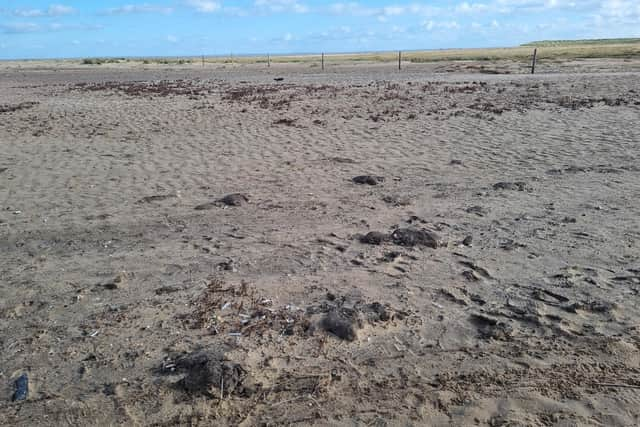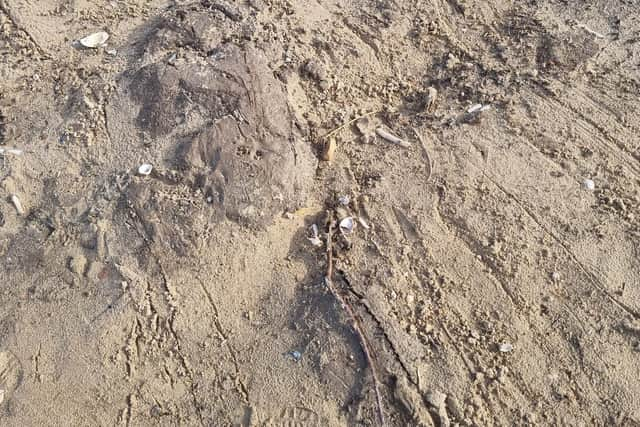Outrage over rise in sewage discharges into Lincolnshire waterways
and live on Freeview channel 276
Siobhan Fowler was on a family trip to Gibraltar Point and said she was was walking along the path from the car park to the beach when she made the discovery.
"I was most perturbed to find a lot of deposits of what looked like processed sewage in clumps along the sand,” she said.
Advertisement
Hide AdAdvertisement
Hide Ad“I take my family to the coast from my home in Horncastle quite regularly but I've never seen anything like it there before.


"Upon closer inspection found it was squidgy when I put my boot on it but firm as though toilet paper fibres were mixed in with it and it had been ‘processed’.
"I’m not saying this is going to stop me goiung to the beach but I find it disturbing this is happening.”
Her concerns come with reports that nationally raw sewage was distarged into bathing waters 31,000 times last year. The Rivers Trust also claims that 0% of England’s rivers are in good chemical health and face threats from every facet of society, with pollution entering our waters from industry, agriculture, medicines and consumer products.
Advertisement
Hide AdAdvertisement
Hide AdTo add to these concerns, most households in England and Wales are this month set to face an increase of £28 (6.2%) a year in their water bills, taking a typical annual bill from £445 to £473, according to industry body Water UK.


The Environment Agency (EA) told Lincolnshire World there are no permitted sewage discharges anywhere near Gibraltar Point and ‘no incidents’ have been reported.
"We kindly ask residents to report incidents to our 24/7 incident hotline on 0800 807060,” a spokesperson said.
However, the EA’s latest Storm Overflow data for Lincolnshire covering 2023 that went live last week shows Mablethorpe Water Recycling Centre spilt 72 times for 444.47 hours into The Wold Grift Drain and Ingoldmells Outfall spilt 50 times for 178.78 hours into North Sea.
Advertisement
Hide AdAdvertisement
Hide AdHorncastle Sports Ground spilt 74 times for 1379.75 hours into Old River Bain and Boston London Road Pumping Station spilt 61 times for 33.1 hours into The Haven (Estuary). Sleaford Water Recycling Centre spilt 84 times for 1102.97 hours into Old River Slea.


Caistor Road Sws, Market Rasen, spilt 31 times for 85 hours into River Rase and Spaw Lane Cso, Louth, spilt 117.0 times for 739 hours into River Lud/Louth Canal.
Anglian Water has pledged to spend £66 million to tackle storm overflows in Lincolnshire, in response to sewage spills into local rivers almost doubling in the last 12 months.
The investment for Lincolnshire includes some £5.6 million for more monitors across the sewer network, almost £1 million for new screens and £37 million to increase treatment capacity to cater for population growth in specific Lincolnshire areas, such as Sleaford, Metheringham and Brant Broughton.
Advertisement
Hide AdAdvertisement
Hide AdAn Anglian Water spokesperson said the company was disappointed by the figures, citing “more extreme weather events” as a cause for the increase, with 70 per cent of the spills taking place in the last three months of 2023.
However, environmentalists say the changes can’t come soon enough.
Rachel Ibbotson from the Zoo Crew at Skegness Aquarium said: “Sewage can have a variety of negative impacts on marine life. Micro-organisms in the sea that break down organic waste, such as is found in sewage, can multiply very quickly when breaking down large amount of this waste, and by doing so remove oxygen from the water.
"If too much oxygen is removed there is not enough left for the remaining fish and other sea creatures to breathe, creating ‘dead zones’.
Advertisement
Hide AdAdvertisement
Hide Ad" Harmful bacteria from sewage can be taken up by shellfish, which if eat by humans can cause food poisoning, meaning that untreated sewage entering the ocean also has knock on effects for people. Anyone swimming or partaking in water sports in these areas also risk being infected by these harmful bacteria.
“Industrial waste may pass through sewage facilities, and if this leaks into the environment it can lead to harmful heavy metals, like lead and mercury, entering the ecosystem.
"These are taken up by the animals living there, including fish that are used for human consumption. If you eat these fish, the heavy metals will accumulate in your body and your organs are unable to remove them or break them down so remain within you.”